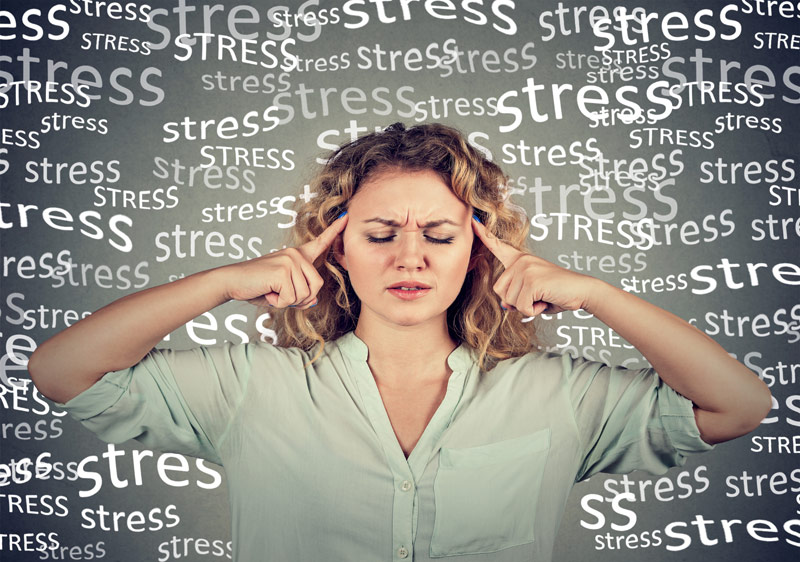Healthy Stress Management Tips
Stress, stress, and more stress. Stress is everywhere and a daily part of our lives. We are all exposed to constant stressors such as emotional stress, chemical stress, dietary stress, environmental stress, physical stress, electromagnetic stress, or financial stress.
Our bodies are designed to deal with brief amounts of stressful events each day, to adapt to it and to rebalance once the stress has subsided. Health issues and illness arise only when our bodies can no longer adapt because the stress has become chronic and the bodies resiliency has broken down.
The body is not designed for constant stress. The stress response is a primitive biological response to protect us from harm. Modern day life provokes a repetitive stress reaction that is unnatural. The cumulative nature of stress is the culprit in the causation of a majority of disease that can take hold after years or even decades of the body having to adapt. The combination of varying stressors bombard our nervous system and inner physiology (such as hormones and neurotransmitters), and over time, a state of “dis-ease” leads to disease.
Common ailments such as fatigue, insomnia, constant colds, irritable bowel syndrome, muscle aches and pains, skin rashes, chronic inflammation, headaches, depression, numbness and tingling, vertigo, poor concentration, hair loss, mood swings, and digestive problems can all be linked to various types of stress. The list of ailments and named diseases are endless. Often the association between stress and the illness is unrecognized, and only the illness gets the attention versus the underlying cause.
The original research on stress and most well-known was conducted by Hungarian endocrinologist Hans Selye beginning in the late 1930s. His studies on stress and its effects on the body still hold true today. Dr. Selye’s basic research identified three areas of the body that breakdown over time with chronic stress – the immune system, the digestive system, and the adrenal glands, which become fatigued.
One of the best ways to measure the integrity of your adrenal glands and to identify the effects of stress on your body is by measuring salivary cortisol and DHEA levels. Cortisol is one of the primary adrenal hormones and an excellent marker to determine adrenal health along with DHEA. An adrenal salivary cortisol profile will test four samples of cortisol output produced in the morning, afternoon, evening, and night, and a morning DHEA level. The results of the test will quantify how healthy or fatigued your adrenal glands are and what to do to restore them.
If you want to start supporting your adrenal glands to restore health, there are a few basic things to do:
- Remove as many of the stressors as you can
- Support the endocrine system with nutrition
- Influence the parasympathetic (calming) nervous system
Some of the herbs, glandular, and hormone supplements you can take to help relax and adapt to stress are:
- Tulsi (Holy Basil) – reduces anxiety, protects against environmental pollutants, improves the sense of well-being, lowers stress hormones
- Panax Ginseng - helps the body adapt to stress, improves physical and mental endurance
- Ashwagandha – helps adrenal fatigue, reduces stress and anxiety, improves stamina and endurance
- Eleuthero – relieves stress by normalizing the highs and lows of the stress response, reduces fatigue
- Oats Milky Seed – calming, reduces anxiety, combats emotional stress
- Kava Kava – helps with restlessness, anxiety, and insomnia
- Valerian Root – increases GABA levels in the brain which is anti-anxiety and sedating, can help with sleep
And what about your basic stressors? Four simple areas to focus on that can be stressors are air, water, food, and sleep. Air can be thought of as how well do you breathe and air quality. Do you find that you hold your body tight all day and prevent deep breathing? A simple way to relax is to take long, deep breaths. Try taking time a few times each day and take five long breaths in and slow breaths out while pausing at each phase of breathing.
- Water – do you drink enough, is it filtered? If possible drink chlorine free and fluoride free water
- Food – we could talk for days about this
- Sleep – are you getting enough, are you sleeping restfully or restlessly?
And finally, what are you doing to restore the balance between the parasympathetic (calming) and sympathetic (stress) nervous system, and why do you need to? The answer is that by influencing the nervous system to calm down, it regulates the adrenal glands and endocrine system by decreasing stress hormone output and restoring balance to a stress-biased system.
How do you do this? I would say one of the answers is coming to Chill Space. My motivation in opening Chill Space was to offer a reprieve from everyday stress – a place to achieve restoration, relaxation, and rejuvenation. Our therapies by design cater to a variety of needs and clientele because the bottom line is that it’s all about recovery and resetting yourself. Floatation, cryosauna, and infrared sauna all deliver a reset in the balance between the sympathetic (stress) and parasympathetic (calming) nervous system.
While there are many ways to relax, I wanted to use therapies that have a profound effect on the nervous system in a short amount of time. Over twenty years in practice I felt there was a need to help people under stress even if they were not a patient and one of the most common patient presentations is not feeling well due to stress.
About the Author
Dr. Josh Kantor is a NYC Chiropractor, Applied Kinesiologist, and Owner of Chill Space NYC, a Leading Manhattan Health and Wellness Spa.




Comments
Post a Comment